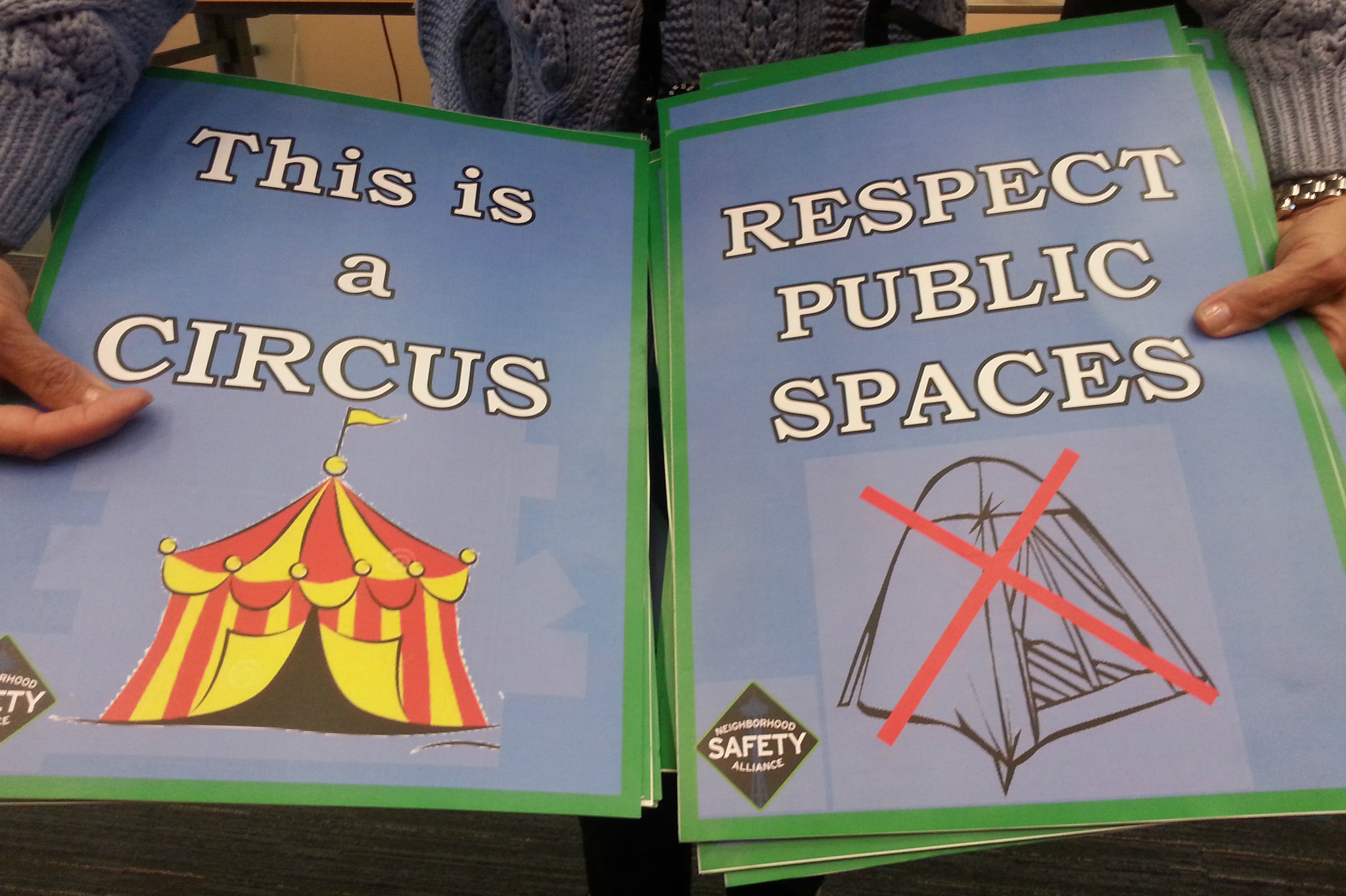Yesterday, a five-member majority of the Seattle City Council voted to introduce a bill that would only allow the city to clear homeless encampments if there is somewhere for the campers to go. The bill will probably be amended before going to a full vote, but the simple act of a majority voting to put it on the legislative schedule amounted to a rebuke of Mayor Ed Murray’s current policy of evicting homeless encampments from public property.
“It’s clear that the city’s protocols…have come up short,” said councilmember M. Lorena Gonzalez, who cast the deciding vote. “Status quo is not acceptable.”
It was the council’s first full meeting since the end of their annual two week recess. In a packed council chamber full of people holding signs for and against the anti-eviction bill, Councilmember Mike O’Brien introduced the bill, which was authored by the state ACLU and Columbia Legal Services and cosponsored by Rob Johnson, Kshama Sawant, and Lisa Herbold. Councilmember Tim Burgess was the sole “no” vote.
As we’ve reported previously, the bill would only allow the city to evict homeless encampments if they could offer them real, immediate housing as an alternative. In cases of urgent public health or safety risks (say, a camp on a ledge above the highway), the city could force campers to move to a safer location nearby. The bill would also dramatically increase the time between posting notice-of-eviction and actual eviction, create a $250-plus-damages liability for the city in case of bad evictions, and requires the city to investigate complained-about encampments for imminent public safety threats like mounds of human waste or fire hazards.
The vote was an activist coup against Councilmember Sally Bagshaw, a stalwart moderate who chairs the council’s Human Services and Public Health committee. This year, she has strived to lead council policy as a diplomat and dealmaker between council factions and Murray—for instance, brokering a deal to indefinitely delay Murray’s plan to evict the archipelago of homeless encampments known as the Jungle. But yesterday, when Bagshaw declined to introduce the anti-eviction bill, a majority of her peers voted to send it to her HSPH committee anyway. As blogger Kevin Schofield observed:
@CaseyJaywork @seattlish counterargument: she lost today's fight, essentially a vote of no confidence in her leadership on homeless crisis.
— SCC Insight (@SCC_Insight) September 6, 2016
During public comment, homeowners and business representatives from many neighborhoods, including the International District and Ballard, spoke against the bill. Jennifer Aspelund of the Neighborhood Safety Alliance, which we’ve written about before, spoke passionately against turning police “into a mere babysitter for a select population.”
“We have laws in place to ensure clean spaces for all citizens of Seattle,” Aspelund said. “However, those squatting outside seem to be exempt from those laws.”
On the Facebook page for KIRO’s Ron & Don Show, whose hosts recently debated (for laughs, they later said) whether to banish Seattle’s homeless population to a literal island, Aspelund expanded on her views:

Another NSA representative, broker Gary Hunter, began by describing how long his family line has been living in Seattle. “I’m a graduate of Queen Anne high school, so I feel like I’m invested in this,” he said. “Enforce the law and protect us,” he told the council, adding that “empowerment without shame” is also important.
Pang Yee, an elderly resident of the International District, said through a translator, “We do feel sorry for all the homeless, and we are also concerned about their wellbeing every day. Crime in the Chinatown/International District has been increasing dramatically.” She went on to ask the council to not introduce the anti-eviction bill because, she said, of the 30 day’s notice requirement.
Others spoke in favor of the bill, calling it humane and practical. Lisa Daugaard, director of the Public Defender Association, said that there is a “false dichotomy” in discussion of homelessness policy between public safety and encampment protections. “Shutting down encampment by encampment does not reduce…the problem of public disorder that people living in public presents,” she said. Dauagaard said the bill is about “eliminating false solutions and moving us closer to real solutions,” in part by requiring that the city “can’t tell people they can’t live in public unless we have somewhere else for them to go.”
Later in public comment, Sonny Nguyen of API Food Fight Club responded to the comments made earlier by older Chinatown residents by accusing them of arranging a “secret meeting” with public safety advisor Scott Lindsay prior to the council meeting. Nguyen said that those representatives “do not speak for Chinatown/International District.
“The last time I was here,” they said, “I was standing against Chinatown’s use as a pawn in the narrative to shut down hookah lounges. It seems like the city only comes to Chinatown when they need to use us and pit us against other disenfranchised communities.”
The meeting was briefly interrupted when council president Bruce Harrell ordered security to remove several people who supported the bill and were loudly upset that they would not get to comment before the meeting got underway.
cjaywork@seattleweekly.com
This post has been edited to correct Nguyen’s gender and to clarify that they accused Chinatown elders of arranging the “secret meeting” with Lindsay, not vice versa.








